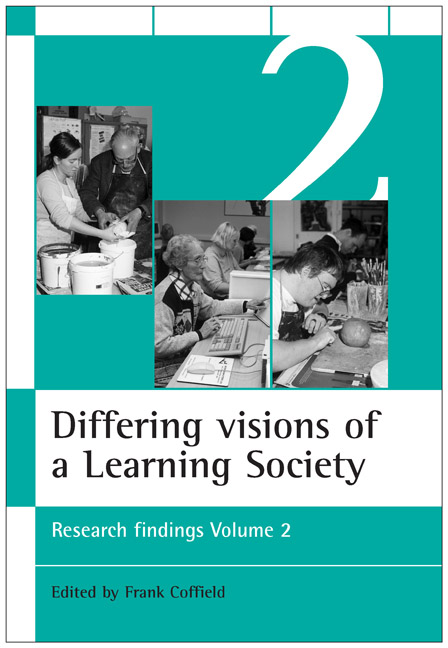Book contents
- Frontmatter
- Contents
- Notes on contributors
- Dedication
- The three stages of lifelong learning: romance, evidence and implementation
- one The meaning of the Learning Society for adults with learning difficulties: bold rhetoric and limited opportunities
- two Networks, norms and trust: explaining patterns of lifelong learning in Scotland and Northern Ireland
- three Learning culture, learning age, learning society: turning aspirations into reality?
- four Teaching and learning in higher education: issues of innovation
- five Participating in the Learning Society: history, place and biography
- six Skills in the British workplace
- Index
- The Learning Society series
four - Teaching and learning in higher education: issues of innovation
Published online by Cambridge University Press: 05 July 2022
- Frontmatter
- Contents
- Notes on contributors
- Dedication
- The three stages of lifelong learning: romance, evidence and implementation
- one The meaning of the Learning Society for adults with learning difficulties: bold rhetoric and limited opportunities
- two Networks, norms and trust: explaining patterns of lifelong learning in Scotland and Northern Ireland
- three Learning culture, learning age, learning society: turning aspirations into reality?
- four Teaching and learning in higher education: issues of innovation
- five Participating in the Learning Society: history, place and biography
- six Skills in the British workplace
- Index
- The Learning Society series
Summary
Aims and origins
The ethics protocol for phase one of the Innovations in Teaching and Learning in Higher Education project1, launched in September 1997, began with the following statement:
The past decade has seen increased attention to methods of teaching and learning, and the 1997 Dearing Report, Higher Education in the Learning Society, has further emphasised the need for innovative responses to the challenges facing higher education. The agenda for these changes has included increased student numbers and diversity, the promotion of lifelong learning and a learning society, and satisfying the requirements of employment and citizenship. The project aims to examine and interpret the innovative responses of higher education in the recent period to these pressures and opportunities. It will seek to analyse the sources, nature and implementation of recent and current innovations, the obstacles and life histories. It will explore the meanings attached to innovation as process and product. It will therefore attempt to identify:
• the motives, sources of ideas, successes and failures of innovators in a range of subjects in a variety of institutions, and implications for staff satisfaction and rewards;
• the characteristics of innovations generated by individuals, institutions, internally and externally available funding, external scrutiny, national policies and programmes, international models and research;
• the factors (inter-personal, institutional and structural) which do or do not stimulate and support innovation;
• the contribution of new developments in communication and information technologies to innovations in teaching and learning;
• innovation as creation, adaptation, transfer, development, dissemination;
• the contexts of innovation, including those of finance and institutional scale and structure.
Although curriculum change, modularisation, assessment methods, access and emphases on skills and learning outcomes, for example, relate to teaching and learning, these will be contingent rather than central features of the project. The focus will be on those innovations that seek to shape the learning interface of students with teachers, one another, the technologies and materials. These include such processes as problem based learning, open learning, independent learning, distance learning and computer based or supported learning.
This first phase of the project was thus focused mainly on ‘the experiences of innovators’ with respect to a wide range of innovations, and was carried out largely by means of an interview survey.
- Type
- Chapter
- Information
- Differing visions of a Learning Society Vol 2Research Findings, pp. 143 - 170Publisher: Bristol University PressPrint publication year: 2000



